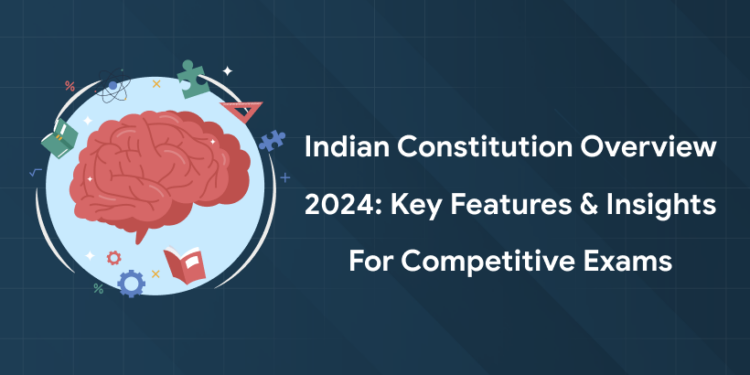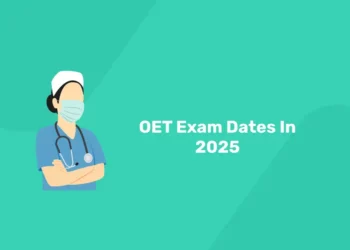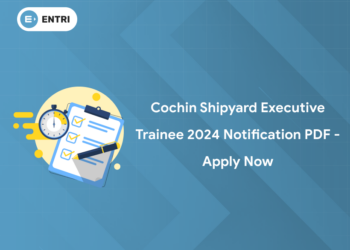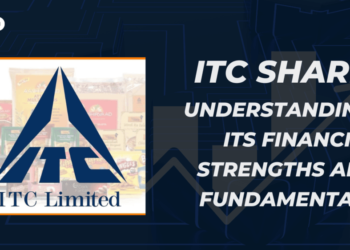Table of Contents
The Constitution is the foundational law of a nation, outlining the core principles that guide its governance. It defines the structure of government and the relationship between the state and its citizens. As a key document in understanding how governments function and shape policies, the Constitution is an essential part of the syllabus for competitive exams like SSC, RRB, TNPSC, KPSC, and more. Go through the quick overview of Indian Constitution!
Laws before the formation of the Indian constitution
Indian constitution has an extensive historical background. The British government in India has passed many acts before Indian independence. Some of them have played a significant role in the structure of the Indian constitution. Important ones are discussed below.
The Regulating Act, 1773
- The ruling of the East India Company was put under the control of the British parliament.
- Governor of Bengal (Warren Hastings) was made the governor-general of all 3 presidencies. (Calcutta, Bombay, Madras)
- A supreme court was established at Fort William (Calcutta) as the Apex Court in 1774.
- The Governor-general could make laws with the consent of the supreme court.
- An Executive Council of the Governor-General was formed with 4 members.
Pitts India Act, 1784
- A 6-member board headed by a British minister was set up and all political responsibilities were given to them
- Placed the Indian affairs directly under the control of the British Government.
- The commercial and political roles of the company separated.
- The Court of Directors managed the commercial activities
Charter acts
| List | Specifications |
| Charter act of 1793 | · Strengthened provisions of previous acts |
| Charter act of 1813 | · The Company’s monopoly over Indian trade terminated; Trade with India was open to all British subjects.· Local autonomous bodies were allowed to levy taxes.· missionaries were permitted to spread Christianity in India |
| Charter act of 1833 | · East India Company was reduced to an administrative and political body· The Governor general’s government became the Indian government and his council the Indian council |
| Charter act of 1853 | · The legislative and executive powers of the Governor-General’s Council were divided.· Started civil service exams for recruiting Indian Employees |
Government of India act,1858
- British crown took over the sovereignty over India and ended company rule.
- There was no popular participation and the British had absolute imperial control over India.
- There was a Secretary of State of India who exercised the crown’s power in India with the help of a council of 15 members.
- All authority of India was given to the governor-general who was newly termed as viceroy, who was responsible to the Secretary of state of India, who in turn was responsible to the monarch.
- The Court of Directors and the Board of Control were ended.
Indian Councils Act, 1861
- Indians started getting appointed to the expanded council of governor-general as unofficial members
- Decentralization of powers started with the restoration of power to Bombay and Madras provinces.
Indian council act,1892
- The non-official members of the Indian legislative council were to be nominated by the Bengal chamber of commerce and the Provincial Legislative Council while the non-official members of the Provincial Councils were to be nominated by certain local bodies such as universities, district boards, municipalities, zamindars etc.
- The councils were to have the authority of discussing the budget and forward the inquiries to the executive.
Indian Councils Act 1909 /Morley-Minto Reforms
- Reforms were recommended by Lord Morley (secretary of state) and Lord Minto (viceroy).
- The maximum number of members of the legislative council was raised from 16 to 60.
- The election was introduced in the legislative council.
- Communal electorates were established.
Government of India Act 1919 /Montague-Chelmsford Reforms
· Formulated by E.S. Montague (Secretary of State) and Viceroy Lord Chelmsford.
· Diarchy was administered in provinces.
· Administration subjects were divided into Central and Provincial.
· Provincial subjects were divided into two. Executive councilors were in charge of the reserved list and the ministers were in charge of the transferred list of subjects.
· Indian legislative was made bi-cameral. The Upper house was called the council of states and the lower house the legislative assembly.
Simon commission
· Headed by Sir John Simon.
· Constituted in 1927
· The aim was to enquire into the working of the Act of 1919.
· Report -1930
· The government of India act was drafted accordingly.
The government of India act,1935
· Suggested formation of a federation taking provinces and Indian states as units.
· The power of the crown was directly exercised in provinces by governors with the help of ministers and governors were no longer subservient to the governor-general in provincial legislation. In special cases, the governor had to follow the directions of the governor-general who was instructed by the Secretary of state.
· Diarchy was introduced at the centre and abolished at the provincial level.
Cripps Mission
· By sir Stafford Cripps in March 1942
· Contained proposals by the British government that could be adopted after world war if Congress and the Muslim League agreed with them.
· Suggests to form an elected constituent assembly for India for the drafting of the Indian constitution and give Dominion status.
· Suggested an Indian union comprising of all the provinces and princely states. People were given the choice to join or not.
Cabinet Mission
· In march 1946 Lord Attlee sent Cabinet mission to India
· Members: Sir Stafford Cripps, Pethvick Lawrence, A.V. Alexander
· Aim: to make Indian independence as early as possible by helping to set up a constituent assembly.
Mount Baton Plan
· June 3, 1947
· Consisted of plans for transferring power to Indians and on the partition of the country.
The Indian independence act, 1947
· India became independent of the British crown and all the treaty relations with the tribal areas lapsed from that date.
· The secretary of state position was eliminated.
· The constituent assembly became the provisional parliament of India.
Constituent Assembly of India
1: Who was the first woman President of India?
The members of the Constituent Assembly were chosen by the provincial assemblies by a single, transferable-vote system of proportional representation.
| Total members | Elected from provinces | Elected from princely states | Elected from chief commissioner provinces (Delhi, Ajmer-Merwar, Coorg, British Baluchistan |
| 389 | 292 | 93 | 4 |
The elections for the 296 seats allotted to the British Indian provinces were finished by August 1946. Congress and the Muslim League won 208, 73 seats respectively. The Constituent Assembly’s first meeting was on 9 December 1946. Only 299 members were present after partition and among them, only 24 members were present for voting. The constitution of India was adopted and given to the people of India on 26 November 1949. From 14 August 1947, the constituent assembly acted as a ruling body and successor to the British parliament’s authority in India. It took 2 years 11 months and 18 days and 6.4 million for the formation of the constitution of India. When coming to force, the Indian constitution had 395 articles, 8 schedules, 22 parts.
Indian constitution and important dates
| Date | Event |
| 9 November 1946 | Constituent Assembly was formed |
| 11 December 1946 | Rajendra Prasad was appointed as the president, H.C. Mukherji as the vice-chairman and B.N.Rao as constitutional legal advisor |
| 13 December 1946 | ‘Objective Resolution’ was introduced by Jawaharlal Nehru |
| 22 January 1947 | Objective resolution passed |
| 22 July 1947 | National flag approved |
| 15 August 1947 | Gained independence |
| 29 August 1947 | Appointment of the drafting committee |
| 26 November 1949 | Indian constitution was passed and adopted |
| 24 January 1950 | The final meeting of the Constituent Assembly |
| August 29, 1947. | A drafting committee was appointed |
Dr B. R. Ambedkar was chosen to the position of the Chairman of the drafting committee. The rest of the members of the committee were as follows:
- N. Madhava Rao (instead of B.L. Mitter)
- Alladi Krishnaswamy Iyer
- Gopala Swami Ayyangar
- T. T. Krishnamachari (instead of D.P. Khaitan).
- Muhammed Saadulah
- K.M.Munshi
Committees
Below discussed are some of the important committees formed during the drafting of the Constitution
| Topic | |
| Committees and their heads |
Important articles of the Indian constitution for SSC, TNPC, RRB, KPSC
Some of the important articles of the Indian constitution that have frequently appeared in the General awareness section of competitive exams are mentioned below.
| Topic | |
| Indian constitution articles |
Download the Entri app to learn more about important parts of syllabus and frequently asked questions of SSC, TNPC, RRB exams.











